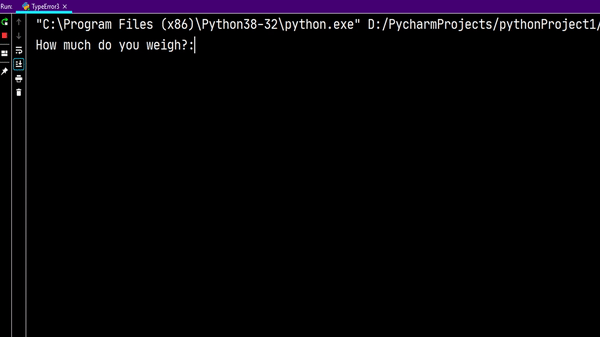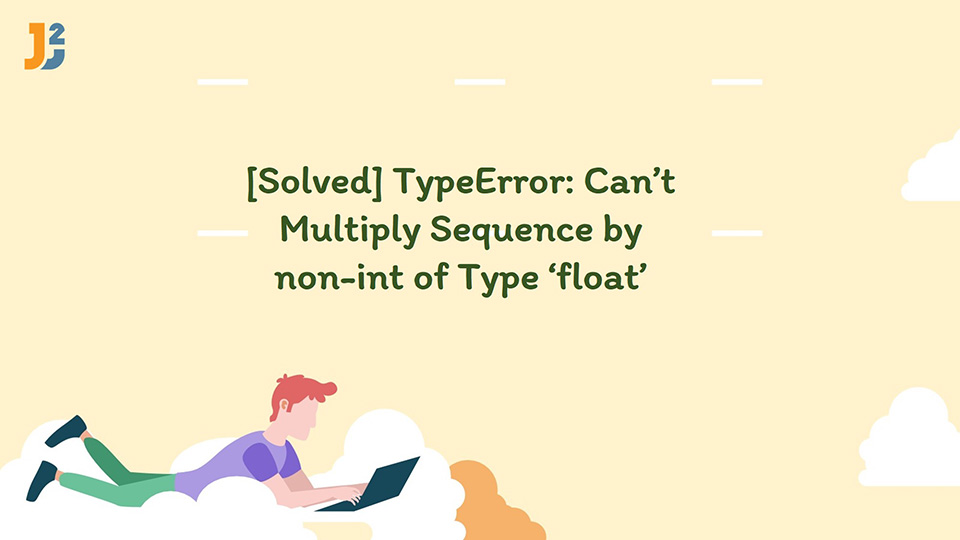Table of Contents
Have you ever come across this stupid bug while coding: typeerror: can't multiply sequence by non-int of type 'float'? I can really feel your frustration when you encounter such bugs. That’s why I am going to make sure that you can resolve this error after reading this article.
Problem Formulation: Fixing typeerror: can't multiply sequence by non-int of type 'float' in Python.
💡 Example 1
Aim: The following program accepts the required user inputs to calculate the BRM and BMRF values.
|
1 2 3 4 5 6 7 8 9 10 |
weight = input('How much do you weigh?:') age = input('How old are you?:') print('Next I will need your height. Answer as a decimal. ie:5.8 to represent 5 feet 8 inches') height = input('How tall are you?:') bmrm = 66 + (13.7 * weight) + (5 * height) - (6.8 * age) bmrf = 65 + (9.6 * weight) + (1.8 * height) - (4.7 * age) print('BMRM: ', bmrm) print('BMRF: ', bmrf) |
Output:

Reason of Error:
You can multiply strings in Python with integers to generate a repeating sequence, as shown below.
|
1 2 3 4 5 6 7 |
text = '*' print(5 * text) |
Output:
However, you cannot multiply float objects with strings in Python. This leads to the occurrence of TypeError: can't multiply sequence by non-int of type 'float'. Let us have a look at an example to verify this.
|
1 2 3 4 |
text = '*' print(5.0 * text) |
Output:
Please refer to this article to go through the causes of TypeError in Python.
If you have a look at the above example, you will notice that we are trying to calculate the bmrm value by multiplying a floating-point value with a string value. This is because input() function returns a string even if the user enters a number. Thus when a string is multiplied by a floating value it leads to the occurrence of TypeError: can’t multiply sequence by non-int of type ‘float’ in Python.
🖊 Solution: Convert String Input To Floating-Point Value
You can avoid the above TypeError by accepting a user input in the form of a floating-point value instead of a string.
Read User Input as Float in Python
You cannot take user input as a float directly. However, input string can be converted into a float value by using the float() function that returns a float value.
Consider the example given below:
|
1 2 3 4 |
value = float(input('Enter a decimal number: ')) print(25*value) |
Output:
Now, let us implement the above concept and get rid of the bug in our program.
🖊 The Solution:
|
1 2 3 4 5 6 7 8 9 10 11 |
weight = float(input('How much do you weigh?:')) age = float(input('How old are you?:')) print('Next I will need your height. Answer as a decimal. ie:5.8 to represent 5 feet 8 inches') height = float(input('How tall are you?:')) bmrm = 66 + (13.7 * weight) + (5 * height) - (6.8 * age) bmrf = 65 + (9.6 * weight) + (1.8 * height) - (4.7 * age) print('BMRM: ', bmrm) print('BMRF: ', bmrf) |
Output:
How much do you weigh?:64
How old are you?:26
Next I will need your height. Answer as a decimal. ie:5.8 to represent 5 feet 8 inches. How tall are you?:5.8
BMRM: 795.0
BMRF: 567.64
💡 Example 2
Practice makes a man perfect!👨🔬 Hence, before we wrap up our discussion, let us have a look at another example to ensure you have a clear understanding of how to overcome TypeError: can't multiply sequence by non-int of type 'float'.
Problem: Write a program that takes an argument, that must be a numerical value (float or int). It should return a number that equals 3.14 times the entered value.
For example:
- When user input is “Hello”.
- Output:-
None
- Output:-
- When user input is 25.25.
- Output:- 79.285
Your Code:
|
1 2 3 4 |
num = input('Enter a decimal number: ') print(num * 3.14) |
Output:
Traceback (most recent call last):
File “D:/PycharmProjects/pythonProject1/demo.py”, line 2, in
print(num * 3.14)
TypeError: can’t multiply sequence by non-int of type ‘float’
🖊 Solution:
The obvious reason that lead to the occurrence of TypeError in your code was line 2 wherein you tried to multiply a string input with a floating point value.
- To avoid the error you must ensure that the user input is a float value.
- Secondly, you have to check if the type of value is a string or a numerical value.
|
1 2 3 4 5 6 7 8 |
num = input('Enter a decimal number: ') try: print(float(num) * 3.0) except: print("You have entered an Invalid Value!") |
Output:
Enter a decimal number: 25.25
79.285
Explanation
- When the user input is a number, the
tryblock gets executed. Here, the user inputnumis type-casted to a floating-point value and multiplied by 3.14. - When user input is a string, the
exceptblock gets executed.
💡 Example 3
Until now you have seen that TypeError: can't multiply sequence by non-int of type 'float' occurs while multiplying a string with a float value. However, this error will appear every-time you try to multiply any sequential data-type (string, tuple or lists) and a floating point value.
Example:
|
1 2 3 4 5 6 7 8 9 10 11 |
li = [2,4,6,8] # list tup = (1,2,3,4,5) # tuple print(2.0*li) print(2.0*tup) # DESIRED OUTPUT: # [2, 4, 6, 8, 2, 4, 6, 8] # (1, 2, 3, 4, 5, 1, 2, 3, 4, 5) |
Output:
TypeError: can’t multiply sequence by non-int of type ‘float’
🖊 Solution:
To avoid the error you have to convert the float value to an integer value as shown below.
|
1 2 3 4 5 6 |
li = [2,4,6,8] # list tup = (1,2,3,4,5) # tuple print(int(2.0)*li) print(int(2.0)*tup) |
Output:
Conclusion
Thus in this article we learned that TypeError: can't multiply sequence by non-int of type 'float' occurs when you try to multiply a string (list or tuple) and a floating-point value together. To solve this error you must ensure that the string values are converted to floating-point values before performing the multiplication.
I hope this article helped you. Please subscribe and stay tuned for more exciting articles in the future. Happy learning! 📚



